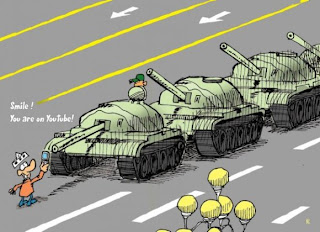
Johns Hopkins University visiting professor and acclaimed author Azar Nafisi gave an extraordinarily moving and insightful keynote speech at the outset of the April 12 GWU conference on "Iran's Blogosphere and Grassroots Voices." I watched it for a second time this evening, and found that, like any profound film or fine work of theater, there was more to appreciate, and more to learn the second time around.
Nafisi was particularly eloquent in describing how Tehran's rulers have perverted the meaning of Islam to support their totalitarian political agenda, obscuring even the religion's true historical role in Iranian life. To make the point, she recalled how horrified her own grandmother was by the excesses of the Iran revolution. "My grandmother," she related, "who never took off her veil, had the same idea as I did. And she would cry, and tell us this is not the real Islam, because they do not flog people and they do not put young women in jail and give them virginity tests, they do not insult God's children in this way if they are true Muslims." The regime was emblematized, she stressed, by a blind censor in Tehran who had once ruled whether plays that he himself could not see were appropriate for the city's theater audiences.
For all of the present travails of Iranians, Nafisi does take some comfort in the fact that in the wake of the contested June 2009 presidential elections, some important truths about Iran are finally emerging from behind the cardboard images that three decades of the mullah's authoritarian theocracy as well as Western stereotypes have helped erect.
 "Finally," she said, "those voices and those images that had been forced underground for so many years, have burst and blossomed on the Internet and television screens." She is convinced that the protesters -- or at least the broad societal impulses they represent -- will eventually triumph because their movement is about qualitatively changing Iran, not simply about playing politics. Americans should not be led astray by confusing the image of the ruling mullahs and their conservative supporters with the reality of a far more diverse Iran than Tehran is willing to acknowledge. The broader Iran longs to connect with world civilization, to which Persia has traditionally belonged. Nafisi reminded the audience that "Your best weapon is not the military; your best weapon is your culture."
"Finally," she said, "those voices and those images that had been forced underground for so many years, have burst and blossomed on the Internet and television screens." She is convinced that the protesters -- or at least the broad societal impulses they represent -- will eventually triumph because their movement is about qualitatively changing Iran, not simply about playing politics. Americans should not be led astray by confusing the image of the ruling mullahs and their conservative supporters with the reality of a far more diverse Iran than Tehran is willing to acknowledge. The broader Iran longs to connect with world civilization, to which Persia has traditionally belonged. Nafisi reminded the audience that "Your best weapon is not the military; your best weapon is your culture."

















